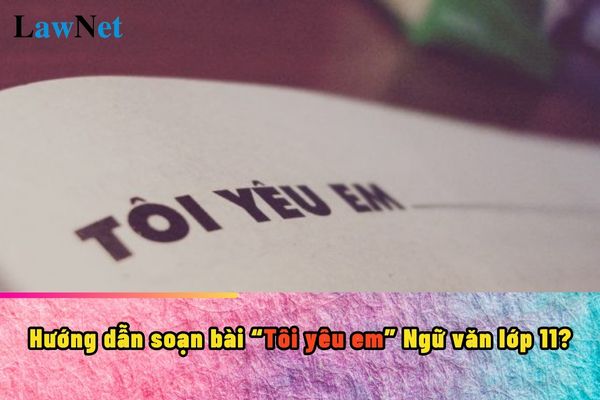What are guidelines on preparing the lesson Tôi yêu em for grade 11 students in Vietnam? What are the elective subjects for upper secondary school students in Vietnam?
What are guidelines on preparing the lesson Tôi yêu em for grade 11 students in Vietnam?
"Tôi yêu em" is one of the texts that students will learn in the Grade 11 Literature curriculum.
Students can refer to the followingguidelines on preparing the lesson Tôi yêu em in Grade 11 Literature.
|
Guidelines on preparing the lesson Tôi yêu em for grade 11 students * Main Content: |
*Note: Information is for reference only./.

What are guidelines on preparing the lesson Tôi yêu em for grade 11 students in Vietnam? What are the elective subjects for upper secondary school students in Vietnam? (Image from the Internet)
What are the study topics in Literature for grade 11 students in Vietnam?
Based on Subsection 2, Section 5 of the Literature Education Program issued with Circular 32/2018/TT-BGDDT, the study topics for Grade 11 Literature students include:
| Requirements | Content |
| Topic 10.1. RESEARCH AND WRITE A REPORT ON A FOLK LITERATURE ISSUE | |
| - Understand the requirements and methods of researching a folk literature issue. | 1. Requirements and methods for researching a folk literature issue. |
| - Know how to write a research report. | 2. How to write a research report. |
| - Apply some knowledge from the topic to read, understand, and write about folk literature. | 3. Some issues that can be researched about folk literature. |
| - Know how to present a folk literature issue. | 4. Requirements for organizing a presentation on a folk literature issue. |
| Topic 10.2. THEATRICALIZATION OF A LITERARY WORK | |
| - Understand what theatricalizing a literary work is. | 1. Literary work and the theatricalization of a literary work. |
| - Know how to conduct the theatricalization of a literary work. | 2. Steps to conduct the theatricalization of a literary work. |
| - Know how to play roles and perform. | 3. How to role-play, act, and practice the theatricalization of a literary work. |
| - Recognize the difference between language in literary texts and language in theatrical texts. | 4. Language in literary texts and multi-modal language in theatrical texts. |
| Topic 10.3. READ, WRITE, AND INTRODUCE A POETRY COLLECTION, A SHORT STORY COLLECTION, OR A NOVEL | |
| - Know how to read a poetry collection, a short story collection, or a novel. | 1. Methods to read a poetry collection, a short story collection, or a novel. |
| - Know how to write an introduction for a poetry collection, a short story collection, or a novel. | 2. How to write an introduction for a poetry collection, a short story collection, or a novel. |
| - Know how to present and introduce a poetry collection, a short story collection, or a novel. | 3. Requirements for presenting and introducing a poetry collection, a short story collection, or a novel. |
What are the elective subjects for upper secondary school students in Vietnam?
Based on Section 3 of the Education Program issued with Circular 32/2018/TT-BGDDT:
1. Basic Education Stage
1.1. Primary Education
a) Educational Content
Compulsory subjects and educational activities: Vietnamese language; Mathematics; Ethics; Foreign Language 1 (in grades 3, 4, 5); Natural and Social Science (in grades 1, 2, 3); History and Geography (in grades 4, 5); Science (in grades 4, 5); Informatics and Technology (in grades 3, 4, 5); Physical Education; Arts (Music, Visual Arts); Experiential Activities.
Elective subjects: Ethnic Minority Language, Foreign Language 1 (in grades 1, 2).
b) Teaching Time
Teaching is carried out for two sessions/day, with no more than 7 periods/day; each period lasting 35 minutes. Educational institutions not yet capable of organizing two sessions/day shall implement the educational plan as guided by the Ministry of Education and Training.
...
1.2. Lower Secondary Education
a) Educational Content
Compulsory subjects and educational activities: Literature; Mathematics; Foreign Language 1; Citizenship Education; History and Geography; Natural Sciences; Technology; Informatics; Physical Education; Arts (Music, Visual Arts); Experiential Activities, Career Orientation; Local Educational Content.
Elective subjects: Ethnic Minority Language, Foreign Language 2.
b) Teaching Time
...
2. Career Orientation Stage
2.1. Educational Content
Compulsory subjects and educational activities: Literature; Mathematics; Foreign Language 1; History; Physical Education; National Defense and Security Education; Experiential Activities, Career Orientation; Local Educational Content.
Elective subjects: Geography, Economic and Legal Education, Physics, Chemistry, Biology, Technology, Informatics, Music, Visual Arts.
Students choose 4 elective subjects.
...
The elective subjects for upper secondary school students include 4 subjects: Geography, Economic and Legal Education, Physics, Chemistry, Biology, Technology, Informatics, Music, Visual Arts.
>>> Download General Education Program issued with Circular 32/2018/TT-BGDDT.
(Note: Some contents in this document are amended by Article 1, Article 2 of Circular 13/2022/TT-BGDDT).

